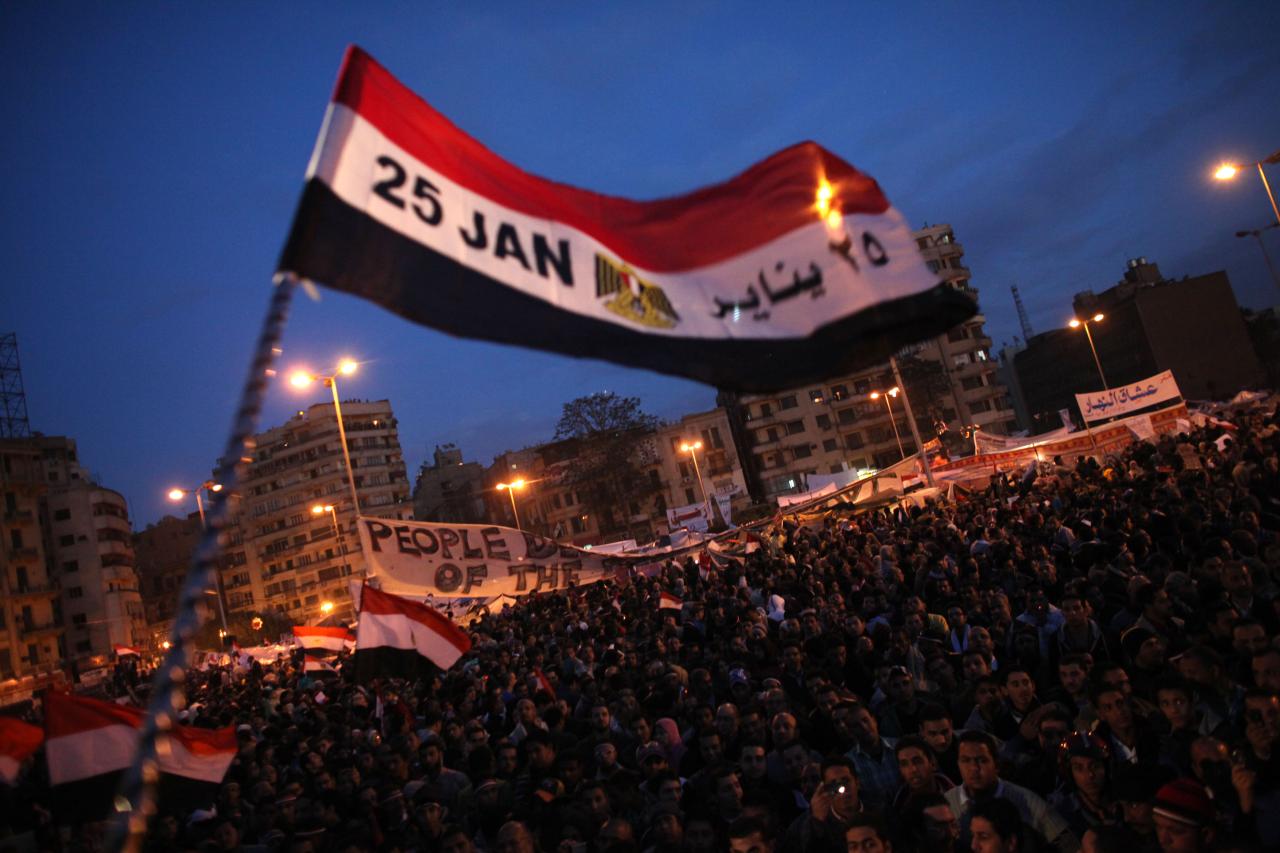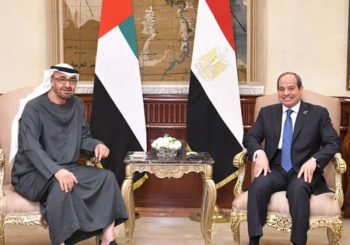In a speech delivered in late December at the Ministry of Endowments to commemorate the birth of Prophet Muhammad (PBUH), President Abdel Fattah al-Sisi asked the “group calling for a new revolution” if they want to “ruin this country”.
Five years ago in January, hundreds of thousands took to the streets, leading to the ouster of then-President Hosni Mubarak who ruled the country for around 30 years.
Back in 2011, Sisi was still a member of the military council that ruled the country during a post-Mubarak transitional period. In mid-2012, he was appointed as Defense Minister under the rule of then-President Mohamed Mursi, who hails from the Muslim Brotherhood group. Mursi was elected president with a slim majority around a year-and-a-half after Mubarak’s ouster.
But following mass protests against his rule in July 2013, Mursi also was overthrown when his Defense Minister announced in a televised speech that a new “roadmap to democracy” would be adopted.
The past five years have witnessed sporadic periods of turmoil that often escalated in January every year.
Today, analysts disagree on whether the state has a clear approach toward possible protests that might erupt to mark the uprising’s fifth anniversary.
On the one hand, the political scene has featured pressures on political activists, and on the other hand, attempts to ease the situation for political detainees as well as reports about a possible presidential amnesty for a number of prisoners.
Activists Prosecuted
On December 21, security forces arrested six activists from the famous April 6 Youth Movement after a protest they held in Tahrir St. in Giza’s Dokki district.
Founded in 2008, April 6 is seen as one of the movements that sparked 2011’s popular uprising, which led to the overthrow of long-serving president Mubarak.
The key charges leveled against the movement’s members were “belonging to a banned group” and organising a protest without obtaining approval from the Interior Ministry, according to the “Freedom for the Brave” Facebook page, which quoted lawyer Mohamed Baqer.
Around a week later, on December 30, another activist was arrested. Sherif Diab, a co-founder of the Bedaya movement, was arrested for “illegally founding” a movement dubbed “The January 25 Movement” and for “incitement to overthrow the government”.
The prosecution ordered that Diab, along with three other activists arrested with him, be temporarily detained pending investigation.
Precautionary Arrests
Egyptian human rights lawyer Doaa Mostafa told Aswat Masriya that there was no group named the “January 25 Movement” in the first place, adding that the cases in which youth have be arrested in the past days were “fabricated by the Interior Ministry” which fears the possibility of youth taking to the streets to protest in commemoration of the January 25 uprising.
She believes the ministry is after activists who have street influence.
Medical Amnesty, Civil Society Visits to Prisons
On January 5, the Interior Ministry allowed the state-sanctioned National Human Rights Council (NHRC) to visit the Torah High Security Prison, commonly dubbed Aqrab (scorpion), for inspection. The centre had asked to see more than 20 prisons across the country.
Aqrab has been under excessive criticism lately from human rightists, who were told by detainees’ families about the facility’s harsh conditions. Families also claimed that family visits were not allowed and inmates were not provided by enough blankets and warm clothing for the winter.
Eventually, after several Facebook statuses about the barring of visits and the prison’s conditions went viral on social media, family visits were sanctioned on December 17.
Another incident was praised by rightists as a step in the right direction: the Cairo Criminal Court acquitted young female prisoner Esraa el-Taweel who was charged with joining a terrorist group. The court’s decision to release Esraa was based on her medical conditions.
Anticipations for January 25, 2016
Ammar Ali Hassan, a political researcher, believes that the political scene in the country largely depends on the authorities’ perception of the anniversary.
“There are two policies that seem contradictory but are complementary” in the mind of those in power.
The first policy is arresting some young activists who are believed, by security apparatuses, to have the ability to mobilize street protests. The state’s security apparatuses gathered information about those activists through field research and through the Internet, with a number of those activists publishing Facebook pages revealing their intent to mobilize protesters. Hassan made a distinction between mobilization and mere participation in protests.
On the other hand, Hassan added: “There is a desire to alleviate the anger among some families and among youth who are angry about the detention and arrests of their peers, including university students. Based on this, some [detainees] were released”.
He sees the recent decisions to release a number of activists in the context of “the security scene ahead of the anniversary of the January 25 Revolution.”
Hassan describes the state’s policy towards the anniversary as a “carrot and stick approach”.
The authorities estimate that “some of the youth in prisons might not participate in demonstrations if they are released, and they might withdraw from the political scene or could be more willing to participate politically through means other than […] protests.”
As to activists who were arrested lately, the state is certain that they have the ability to stage protests on the uprising’s anniversary, according to Hassan.
The political researcher noted that state’s security apparatuses have estimates indicating that masses will not take to the streets on January 25, but they still fear that thousands of angry youth could stage small protests.
Thousands do not constitute a big number when compared to the estimated hundreds of thousands who protested five years ago. But security forces will seek to curb these protests, as small as they may be, which could result in deaths and injuries and a consequent escalation of the situation.
Another political researcher, Ziad Akl, said the regime has not yet reached a concrete vision of how to deal with opposition, especially the youth who supported the Jan. 25 uprising.
Akl, an expert at the Ahram Center for Political and Strategic Studies, says there is puzzlement among the state’s various bodies about the right approach toward the upcoming anniversary.
“Since January 30 [2013], the regime has feared the idea of mobilization and taking to streets, so it issued many legislations to prevent mobilization and it used the media to slander any person who tries to protest [on the street],” Akl said.
Protesters are accused of being funded by enemies of Egypt, affiliated to the Muslim Brotherhood, and plotters who seek to bring down the country and make it descend into the Syria or Libya scenarios, Akl added.
He does not believe the state is using the carrot or stick approach in dealing with the uprising’s anniversary.
“There is talk in the media about a campaign by the president to contain the youth of the revolution, but unfortunately the youth featured [in the context of those media reports] are of the [now defunct Mubarak’s] National Democratic Party, which indicates that the regime wants to create a [segment of] supportive youth just as it created a supportive elite and supportive media.”







Comments (0)